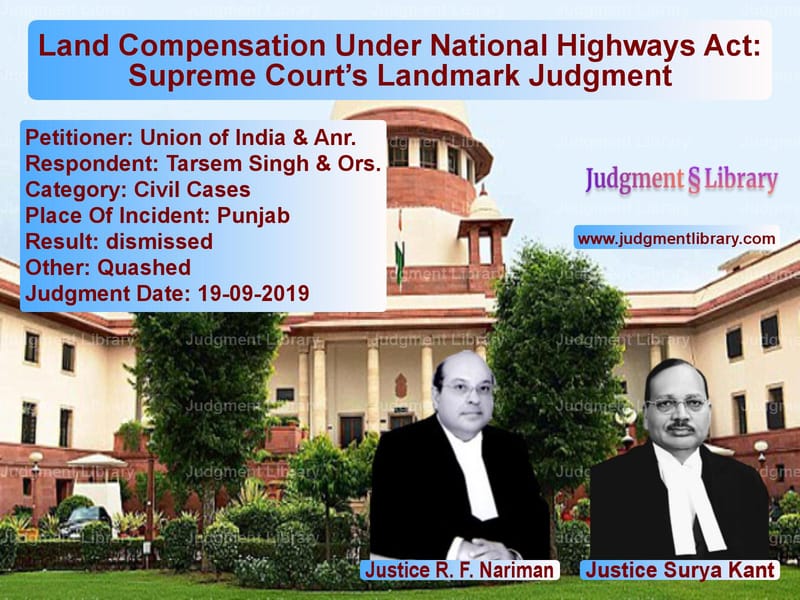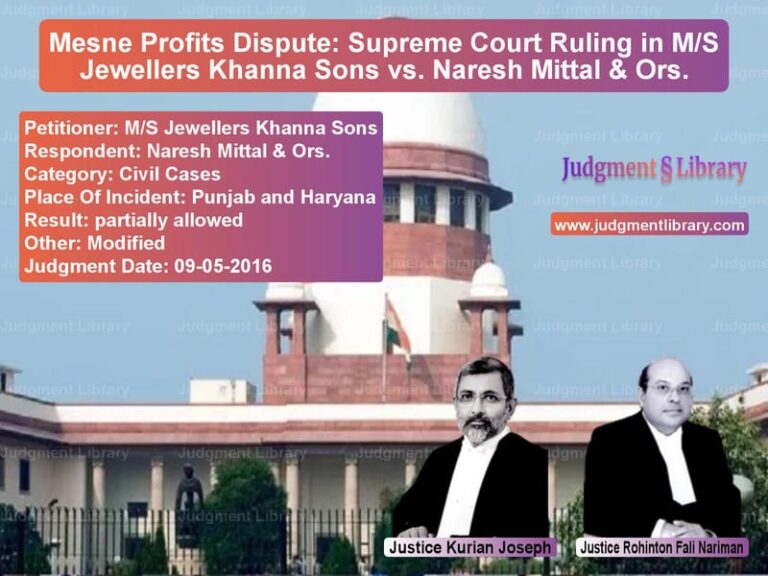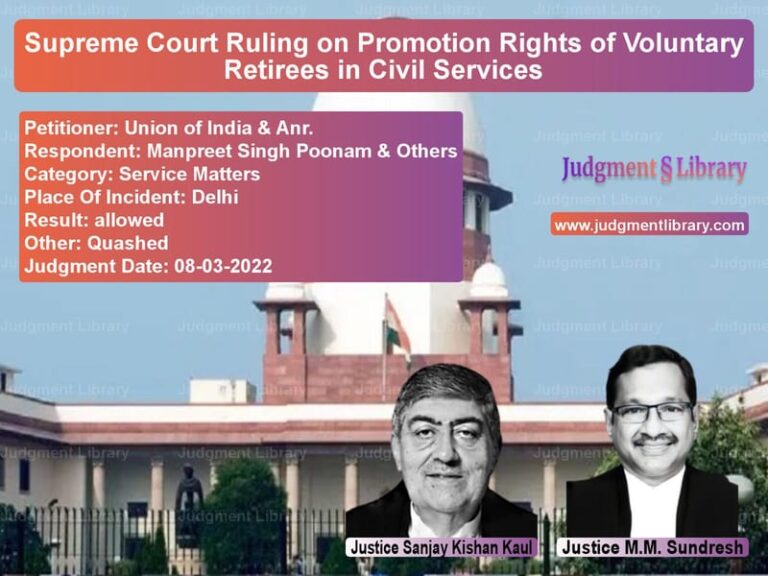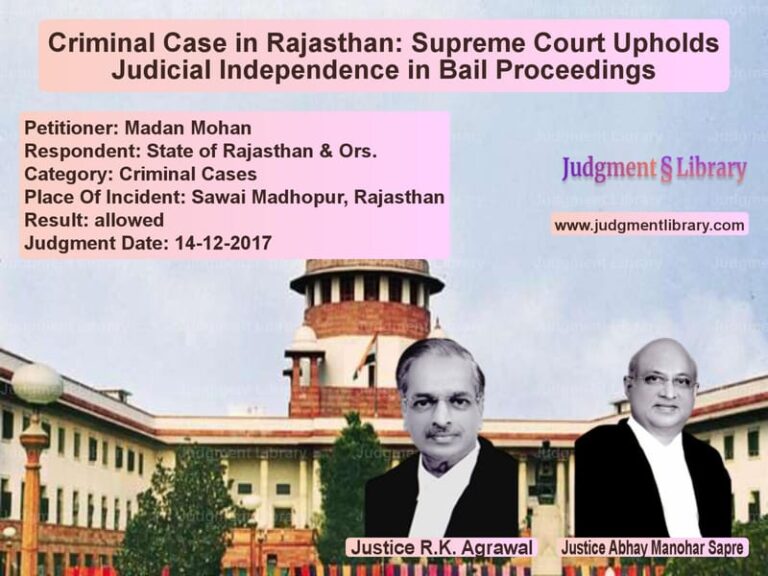Land Compensation Under National Highways Act: Supreme Court’s Landmark Judgment
The Supreme Court of India recently ruled on a significant case regarding land acquisition under the National Highways Act, 1956, particularly focusing on the non-grant of solatium and interest that would otherwise be available under the Land Acquisition Act. The case involved multiple appeals, primarily led by the Union of India, challenging the Punjab and Haryana High Court’s decision that deemed the non-payment of solatium and interest as unconstitutional.
The crux of the matter was whether Section 3J of the National Highways Act, which excludes the applicability of the Land Acquisition Act, violates Article 14 of the Constitution. The High Court ruled that landowners whose properties were acquired under the National Highways Act were being unfairly denied solatium and interest, which were granted under the Land Acquisition Act. The Supreme Court upheld this view and struck down Section 3J to the extent that it denied solatium and interest, thereby ensuring fair compensation to affected landowners.
Background of the Case
The appeals arose from disputes over land acquired for expanding national highways. Under the National Highways Act, landowners were compensated based on market value, but they were not entitled to solatium and interest. In contrast, the Land Acquisition Act provided for an additional 30% solatium and interest on delayed payments. The affected landowners approached the High Court, arguing that this disparity violated their constitutional rights.
Arguments of the Appellants
The Union of India, represented by Senior Advocate Shyam Divan, contended:
- The National Highways Act is a complete code that overrides the Land Acquisition Act, thus solatium and interest were deliberately excluded.
- Landowners under different acquisition laws could not claim uniform compensation, as each law had its purpose and mechanism.
- The acquisition process under the National Highways Act is faster and includes an arbitration mechanism, negating the need for additional compensation.
- Since market value compensation was provided under the Act, there was no discrimination under Article 14 of the Constitution.
- Solatium and interest are statutory rights, not fundamental rights, and their exclusion does not violate the Constitution.
Arguments of the Respondents
Senior Advocates Amit Sibal and Neeraj Kumar Jain, representing the landowners, countered:
- Solatium and interest are integral parts of compensation and must be granted to ensure fair recompense.
- Excluding solatium and interest created an unjustified distinction between landowners whose lands were acquired under different laws.
- Since landowners do not voluntarily give up their property, they suffer an additional burden, which solatium is meant to offset.
- The denial of solatium and interest resulted in landowners under the National Highways Act receiving significantly lower compensation than those under the Land Acquisition Act.
- The government itself had agreed in previous cases to grant solatium, making its denial inconsistent and arbitrary.
Supreme Court’s Analysis
The Supreme Court examined the constitutionality of Section 3J and the principle of fair compensation. It made the following key observations:
- The exclusion of solatium and interest created an unreasonable classification, violating Article 14.
- Solatium is not an arbitrary grant but a necessary addition to compensate for the compulsory nature of acquisition.
- Prior to the 1997 amendment to the National Highways Act, landowners received solatium and interest, and its exclusion lacked justification.
- Under the 2013 Right to Fair Compensation Act, solatium and interest are explicitly provided even for acquisitions under the National Highways Act.
- The court reaffirmed the principle that compensation for acquired land must be just and reasonable, aligning with established legal precedents.
Final Judgment
The Supreme Court struck down Section 3J to the extent that it excluded solatium and interest, declaring it unconstitutional. It ruled:
“The provisions of the Land Acquisition Act relating to solatium and interest shall apply to acquisitions made under the National Highways Act. Consequently, the provision of Section 3J is, to this extent, violative of Article 14 of the Constitution and is declared to be unconstitutional.”
The judgment ensures that landowners whose properties are acquired for highway projects receive equitable compensation, reinforcing the constitutional mandate of fairness in state acquisitions.
Petitioner Name: Union of India & Anr..Respondent Name: Tarsem Singh & Ors..Judgment By: Justice R. F. Nariman, Justice Surya Kant.Place Of Incident: Punjab.Judgment Date: 19-09-2019.
Don’t miss out on the full details! Download the complete judgment in PDF format below and gain valuable insights instantly!
Download Judgment: Union of India & Anr vs Tarsem Singh & Ors. Supreme Court of India Judgment Dated 19-09-2019.pdf
Direct Downlaod Judgment: Direct downlaod this Judgment
See all petitions in Property Disputes
See all petitions in Landlord-Tenant Disputes
See all petitions in Judgment by Rohinton Fali Nariman
See all petitions in Judgment by Surya Kant
See all petitions in dismissed
See all petitions in Quashed
See all petitions in supreme court of India judgments September 2019
See all petitions in 2019 judgments
See all posts in Civil Cases Category
See all allowed petitions in Civil Cases Category
See all Dismissed petitions in Civil Cases Category
See all partially allowed petitions in Civil Cases Category







